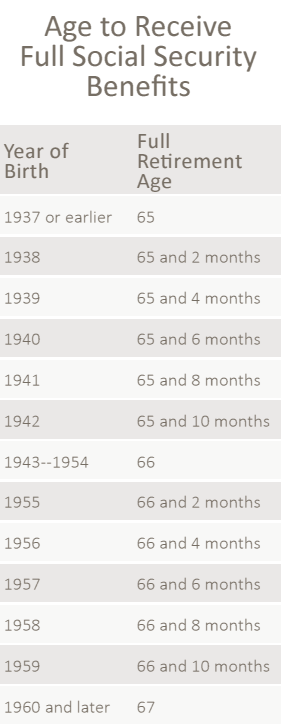Social Security Changes
There have been some significant changes to Social Security Benefits. Listed below are the ages and birth years to receive full Social Security Benefits. Also note that some of these changes will limit individuals from making use of a few “planning opportunities” that used to exist.
Defunding Social Security
The following changes are different from the idea of Defunding Social Security. In these uncertain times many ask about how they will survive during retirement, about their family members in nursing homes and their surviving spouses financial wellbeing. Defunding Social Security would be done by Permanently terminating the 6.2% employee payroll tax and exhausting the Social Security trust fund and cutting retirement benefits. As of now Social Security has not been defunded.
Survivor Benefits
With an exception the “file-and-suspend” option is no longer available as of April 2016. Those couples that are similar in age and that have similar benefits have opportunities to plan. The Social Security benefits that a surviving spouse may receive are based upon the spouse that earned the most of the couple.
File and Suspend
“File and Suspend” has been a strategy that allowed many couples to significantly increase the amount of funds paid out by Social Security over their lifetimes. It worked by allowing one person, usually the one with the higher, or perhaps the only, earnings record to first “file” for Social Security benefits on his or her 66th birthday, and then to immediately “suspend” the request to start his or her monthly payments. This worker, if he or she waits until age 70 to start receiving monthly benefits, will get a 32% larger check at that time, to make up for not collecting anything from Social Security for the prior four years. However, in the interim, this worker’s spouse would file for benefits under the worker’s “suspended” record, and the spouse would receive one-half the amount the worker would have received had monthly checks actually begun. Further, when the first spouse passes away, the second spouse would have her or his monthly check increased to the enhanced amount. With individuals living longer than ever, the likelihood was that couples who used the “file and suspend” technique would receive significantly more back from Social Security than would normally be paid out based on the amount contributed. Therefore, this option is no longer available, except for couples who both turn 66 no later than May 1, 2016.
Restricted Application
Another strategy for maximizing Social Security benefits, filing a “restricted application,” will also be going away for two earner couples. As background, a person may be eligible for Social Security benefits on his or her own work record, or may be eligible for benefits because she or he is the spouse of a worker. Spousal benefits are one-half the amount to which the worker is entitled, and a worker’s own benefits are based upon the amount of money he or she earned subject to FICA tax, and the number of years of earnings. Both spousal and worker benefits are subject to a percentage reduction if taken by those between 62 and 66 years of age. In the past, Social Security allowed a younger spouse/earner to take either the amount this spouse was entitled to under her or his own work record, or take the amount she or he was entitled to under the other spouse’s record, irrespective of which amount was higher. The person could later change the election upon reaching “full retirement age” (see chart on right). This avoided the permanent penalty, while still receiving something each month. Further, the individual could delay filing under her or his own record until age 70 as well, and then get the enhanced amount as well, all the time still receiving something as a “spouse. Again, with individuals living longer, this created the likelihood of couples receiving significantly more back from Social Security than would normally be paid based on the amount contributed. Social Security modified this original rule a few years ago, only allowing this option to spouses who waited until full retirement age to apply for any type of benefit. Social Security has now been directed to again change this rule, so no one will be able to choose between spousal and work benefits. However, there is a longer “lead-in” time for this rule. As long as both spouses are at least 62 as of the end of this year, then the younger spouse will still be able to use this approach when she or he turns 66. The survivor benefit has not changed. The surviving spouse is eligible for 100% of the deceased spouse’s benefit and the surviving spouse may claim the survivor benefit while letting his or her own benefit accrue until age 70. Logically, this choice will also be taken away at some point.
Current Steps
Individuals should review their options thoroughly and consult an attorney in order to maximize their Social Security benefits.
For further information regarding these matters, please contact Mr. Jenney 248 740 5688 or via email.


